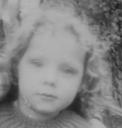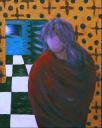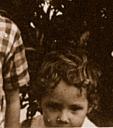May15
  At the age of 25 I scored just under 70 on an IQ test. That’s in the mildly mentally retarded range. But by then I already spoke 4 languages, could scan volumes of books, play instruments, and could recite back long auditory strings outside of the ability of most humans.
 At the age of 25 I scored just under 70 on an IQ test. That’s in the mildly mentally retarded range. But by then I already spoke 4 languages, could scan volumes of books, play instruments, and could recite back long auditory strings outside of the ability of most humans.
I also already had an honors degree in Sociology, a degree in Linguistics. So how could I score so low? Read the rest of this entry »
May15
  Christophe Pillault produces some of the most moving art by people with autism in the world. Severely autistic, functionally non-verbal and with extremely limited self help skills he produces faceless, figurative works of soulful figures interacting. The works are full of movement, passion, yet also great grace Read the rest of this entry »
 Christophe Pillault produces some of the most moving art by people with autism in the world. Severely autistic, functionally non-verbal and with extremely limited self help skills he produces faceless, figurative works of soulful figures interacting. The works are full of movement, passion, yet also great grace Read the rest of this entry »
May14
If art expresses the cognition, perception, social emotional, communication and personality states of the artist, what are we learning from artists with autism? Are we learning about autism at all through their art, and if so, which facets of their autism? Are we in fact learning more about the diversity of autism through the array of works by people with autism and how does this stir up fiercely defended old and new stereotypes? Read the rest of this entry »
May14
  I’ve been an international public speaker since 1994. So I found it so amusing recently when someone posted that I earn $1000 a lecture plus a nice hotel. Wow, so I could potentially be earning $365,000 a year at that rate. Goodness, I could buy my own hotel!  So how true is the fantasy that as an autistic person working as a public speaker that I might live a decadent life of luxury? Read the rest of this entry »
 I’ve been an international public speaker since 1994. So I found it so amusing recently when someone posted that I earn $1000 a lecture plus a nice hotel. Wow, so I could potentially be earning $365,000 a year at that rate. Goodness, I could buy my own hotel!  So how true is the fantasy that as an autistic person working as a public speaker that I might live a decadent life of luxury? Read the rest of this entry »
May13
  Unemployment of adults on the autism spectrum is huge, thought to be at a rate of around 80-90% of people diagnosed as on the autism spectrum have no full time work. Read the rest of this entry »
 Unemployment of adults on the autism spectrum is huge, thought to be at a rate of around 80-90% of people diagnosed as on the autism spectrum have no full time work. Read the rest of this entry »
May12
 Lisa Niehoff works for Mainstream Living, Inc which provides services to the disabled in Iowa. She is editor of the company’s monthly newsletter, ‘The Insider’ which profiles disabled artists. She asked if I could write a profile piece for her magazine so instead I invited her to pose me some interview questions, and rather personal they were. Here’s our interview: Read the rest of this entry »
Lisa Niehoff works for Mainstream Living, Inc which provides services to the disabled in Iowa. She is editor of the company’s monthly newsletter, ‘The Insider’ which profiles disabled artists. She asked if I could write a profile piece for her magazine so instead I invited her to pose me some interview questions, and rather personal they were. Here’s our interview: Read the rest of this entry »
May12
 It was 1996, a time when the rate of autism was still thought to be 1 in 10,000 people, high functioning people with autism were still thought to be rare and it was still believed that around 70% of people with autism were severely mentally retarded.  In that year my honors year that the Sociology lecturer mentioned in my first book, Nobody Nowhere, story writer, Dr Chris Eipper of La Trobe University, got involved with journalist, Kathy Gollan at ABC radio with a story. With no qualification in child development, psychology or psychiatry (nor any medical qualification whatsoever), he was going to deliver to her people who would dispute my formal diagnosis of autism by one of Australia’s leading autism specialists, Dr Lawrie Bartak. To back himself up, he would: Read the rest of this entry »
It was 1996, a time when the rate of autism was still thought to be 1 in 10,000 people, high functioning people with autism were still thought to be rare and it was still believed that around 70% of people with autism were severely mentally retarded.  In that year my honors year that the Sociology lecturer mentioned in my first book, Nobody Nowhere, story writer, Dr Chris Eipper of La Trobe University, got involved with journalist, Kathy Gollan at ABC radio with a story. With no qualification in child development, psychology or psychiatry (nor any medical qualification whatsoever), he was going to deliver to her people who would dispute my formal diagnosis of autism by one of Australia’s leading autism specialists, Dr Lawrie Bartak. To back himself up, he would: Read the rest of this entry »
May12
 Fiona Crosby is a second year English Literature student at Teesside University currently doing an assignment on The Representation of “disability”. She wanted to ask me questions in relation to the representation of “autistic presence†in contemporary cultural forms. This is our interview: Read the rest of this entry »
Fiona Crosby is a second year English Literature student at Teesside University currently doing an assignment on The Representation of “disability”. She wanted to ask me questions in relation to the representation of “autistic presence†in contemporary cultural forms. This is our interview: Read the rest of this entry »
May12
 This month’s featured art work is titled “Eleanor“. It’s title comes from the Beatles song Eleanor Rigby which I feel is a song that captures aloneness. I have rarely felt lonely but I experience aloneness all the time. I’m solitary by nature and by choice and I cherish my solitude enormously, often too much Read the rest of this entry »
This month’s featured art work is titled “Eleanor“. It’s title comes from the Beatles song Eleanor Rigby which I feel is a song that captures aloneness. I have rarely felt lonely but I experience aloneness all the time. I’m solitary by nature and by choice and I cherish my solitude enormously, often too much Read the rest of this entry »
May11
 Sometimes there are things which would be funny if they weren’t so annoying. One of those is where the use of the title “Dr” is taken to mean the person is qualified as a medical doctor, as a psychologist or psychiatrist. In fact “Dr” simply means they have a ‘doctorate‘, a PhD, a piece of paper showing they have achieved the highest level of education in a given field. But that could be a doctorate, a PhD in Philosophy, Sociology, Engineering, even in Biology and they’d have no more expertise to diagnose language, psychiatric, information processing, developmental or personality disorders, than a well read garbo. Read the rest of this entry »
Sometimes there are things which would be funny if they weren’t so annoying. One of those is where the use of the title “Dr” is taken to mean the person is qualified as a medical doctor, as a psychologist or psychiatrist. In fact “Dr” simply means they have a ‘doctorate‘, a PhD, a piece of paper showing they have achieved the highest level of education in a given field. But that could be a doctorate, a PhD in Philosophy, Sociology, Engineering, even in Biology and they’d have no more expertise to diagnose language, psychiatric, information processing, developmental or personality disorders, than a well read garbo. Read the rest of this entry »
 At the age of 25 I scored just under 70 on an IQ test. That’s in the mildly mentally retarded range. But by then I already spoke 4 languages, could scan volumes of books, play instruments, and could recite back long auditory strings outside of the ability of most humans.
 Â Christophe Pillault
 Christophe Pillault


